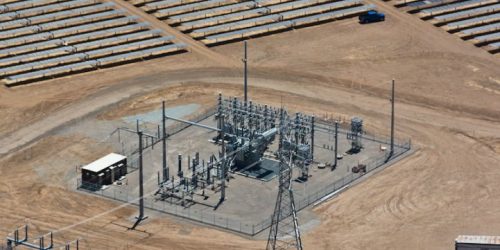Japan’s Hitachi has completed its acquisition of a majority stake in ABB Power Grids worth up to $7.8 billion, creating a new business aimed at tackling the renewable and distributed energy frontiers of the power industry.
Hitachi ABB Power Grids is the new company formed Wednesday by the close of Hitachi’s acquisition of an 80.1 percent stake in the venerable power grids unit of the Swiss-Swedish engineering giant. ABB will now focus on industrial automation, electric transportation and digital solutions.
“A majority stake in ABB Hitachi Power Grids Inc. instantly makes Hitachi one of the largest global grid equipment and service providers, drastically expanding its access to the utility segment in all regions,” said Ben Kellison, director of grid edge research at Wood Mackenzie.
ABB’s Power Grids unit earned about $10 billion in annual revenue last year from its businesses ranging from high-voltage transmission systems and transformers to distribution grid controls and battery systems. Hitachi’s power systems business includes a nuclear power plant unit that’s struggled along with that of Japanese rival Toshiba; a wind turbine business that scaled back direct manufacturing in the past year; and digital solutions in transportation, industrial systems, home and building energy controls and smart cities.
The new company will be led by ABB Power Grids’ Claudio Facchin as CEO and Hitachi Vice President Toshikazu Nishino as chairman. “Combining world-class power solutions with Hitachi’s leading open digital platforms presents us with new market opportunities,” Facchin said in a Wednesday statement.
Hitachi president and CEO Toshiaki Higashihara added that the new power grids business would target broad “energy solutions” across these markets, building on its Lumada data management and automation platform. A key focus will be on “building a zero-carbon society with various measures including the use of renewable energies.”
ABB’s power grid control business includes ADMS, SCADA, EMS and microgrid controls, as well as its enterprise digital solutions’ suite of asset management and data analytics software. On the distributed energy front, it has a partnership with startup Enbala to deliver a distributed energy resource management system, and its long-running microgrids work has increasingly been focused on integrating rising levels of renewable energy, M. Maxine Ghavi, head of ABB Grid Edge Solutions, told Greentech Media at this year’s DistribuTech conference.
Hitachi and ABB’s emphasis on renewables and distributed energy are shared by key rivals such as General Electric and Siemens as they move to diversify from slowing markets for large-scale grid equipment and natural gas turbines.
In 2014, GE outbid Siemens and Mitsubishi to acquire controlling stakes in French energy giant Alstom’s grid, nuclear and renewable energy businesses. But the merger, completed in 2015, turned out poorly for GE, as it faced challenging markets for its grid and hydropower turbine business.
GE has likewise reorganized its energy business units several times, most recently with a revamped renewable energy business that consolidated its solar, wind, energy storage and hydropower units. The new division saw significant losses in 2019, compared to profits at GE’s other industrial divisions, driven by lost business in its hydro and grid solutions units. GE also sold its industrial low-voltage equipment business to ABB for $2.6 billion in 2016.
Siemens announced last year it would spin off its struggling energy division and merge it with its Siemens Gamesa Renewable Energy wind and power turbine supplier, as it refocused its core energy business around electric mobility, distributed energy, smart buildings and energy storage. Siemens intends to move ahead with the spinoff of its energy business in an IPO scheduled for September, despite headwinds from the global COVID-19 pandemic and resulting economic downturn.






